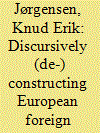| Srl | Item |
| 1 |
ID:
142066


|
|
|
|
|
| Summary/Abstract |
This article is about European foreign policy, specifically an examination of ways in which discourse analysis and foreign policy analysis can be brought together. The first aim of this article is to explicate the explanandum in some detail. Before we know what we are looking for, it gives limited meaning to consider procedures for methodological procedures. Once the explanandum has been identified, the article examines theoretical approaches and critically discusses their promises and limitations. Priority is given to the option of applying constructivist discursive theories that might (or might not) have been developed with a view to analysing foreign policy, including European foreign policy. In doing so, the article aims at bridging several sometimes very different fields of study: discourse theory, which is sometimes utterly unaware of or uninterested in foreign affairs; and foreign policy analysis, which is frequently descriptive in orientation and at times characterized by less-than-benign neglect of discourse theory.
|
|
|
|
|
|
|
|
|
|
|
|
|
|
|
|
| 2 |
ID:
178122


|
|
|
|
|
| Summary/Abstract |
The realist theoretical tradition has never enjoyed a strong position in Europe. During recent decades, although it is commonly claimed otherwise, it even seems to have lost its limited traction and most of its relatively few representatives. The aim of the article is to analyse this evolution, highlight how realist theorists have contributed limited conceptual or theoretical innovation, been unable to adjust their research agenda to current analytical challenges, and produced relatively few comprehensive empirical studies informed by one or more realist theories. Instead, we observe three main activities. Some realists do meta-studies on realist theory. Others do retrospectives, for instance, (re-)discovering the qualities of classical realist scholars or classical concepts such as the security dilemma. Still others practice ideology that may enjoy certain functions in legitimising national foreign policy orientations but has limited theoretical quality. Thus, textbooks are probably the only remaining context in which realism is presented as constituting a dominant orientation; a fact that highlights the complex and problematic relationship between reality and representation.
|
|
|
|
|
|
|
|
|
|
|
|
|
|
|
|